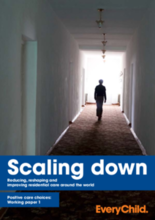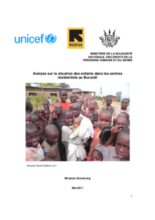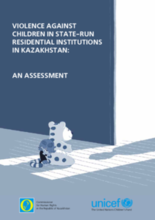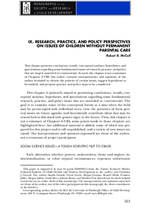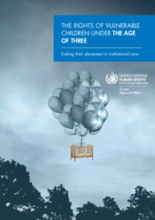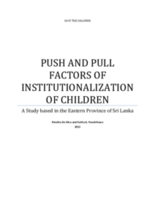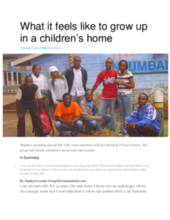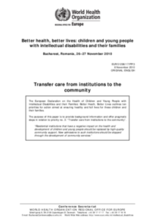Displaying 611 - 620 of 744
This paper summarizes the evidence base on residential care to promote better decision making among policy makers and child welfare practitioners
Le Gouvernement du Burundi, en collaboration avec l’UNICEF et l’ONG International Rescue Committee (IRC), a prévu de faire un état de lieux des centres résidentiels pour les enfants.
This study on violence against children in state-run residential institutions in Kazakhstan was conducted under the national Office of the Commissioner for Human Rights and UNICEF. Data was collected from six different types of state run- residential institutions for children in 3 regions using a multi-methods approach, including surveys with children ( 9-18 years old) and staffs, and interviews with young people (17-23 years old) who had left the care of these institutions.
This chapter presents conclusions, trends, conceptual analyses, hypotheses, and speculations regarding some fundamental issues of research, practice, and policy that are largely unsettled or controversial, regarding children without permanent parental care.
This document was commissioned by the Regional Office for Europe of the Office of the United Nations High Commissioner for Human Rights (ROE OHCHR). One of its aims was to stimulate discussion at the Sub-Regional Workshop on the Rights of Vulnerable Children Aged 0 to 3 Years in Prague on 22 November 2011.
This research on the institutionalization of children in the Eastern Province of Sri Lanka was carried out by Save the Children with the support of the Department of Probation and Children Care Services and National Institute of Social Development.
The first ever World report on disability, produced jointly by WHO and the World Bank, suggests that more than a billion people in the world today experience disability. This report provides the best available evidence about what works to overcome barriers to health care, rehabilitation, education, employment, and support services, and to create the environments which will enable people with disabilities to flourish. The report ends with a concrete set of recommended actions for governments and their partners.
In this recent opinion-editorial, Ucembe recounts the deeply personal experience of being raised in a Kenyan children’s home and his reflections on the harmful impacts of institutional care on children’s development and psychosocial wellbeing.
The purpose of this paper is to provide background information and offer pragmatic steps in relation to priority no. 3 of the European Declaration on the Health of Children and Young People with Intellectual Disabilities and their Families: “To transfer care from institutions to the community”. The paper was produced in preparation for the conference in Bucharest, Romania 26-27 November, 2010.

